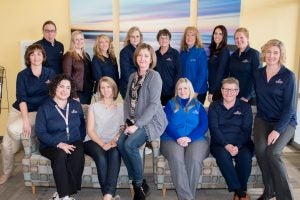
In June, the Boise State Simulation Team was honored at the International Nursing Association for Clinical Simulation and Learning (INACSL) conference for their Simulation Program. The team was selected as the winner of the prestigious 2017-2018 Frontline Simulation Champions Excellence Award for providing exceptional simulation education for undergraduate and graduate students as well as education and consultation for faculty throughout the nation. The award acknowledges a hard working individual and/or team that demonstrates exemplary dedication in the day-to-day implementation of simulation, going beyond the ordinary to demonstrate extraordinary in the delivery of simulation-based learning in academic, healthcare institution, or community settings.
The INACSL’s mission is to advance the science of healthcare simulation, while striving towards a vision of being a global leader in transforming practice to improve patient safety through excellence in healthcare simulation. Kathryn Whitcomb, INACSL Awards Committee Member is quoted saying the “Boise State Simulation Team demonstrates excellence and dedication in healthcare simulation. In a category with many applicants, your team has demonstrated excellence with your wonderful accomplishments, projects and work toward improving students’ learning experiences through simulation. Keep up the wonderful work!”
Faculty members Kim Copeland and Janet Willhaus travelled to Toronto, Canada to accept the award on behalf of the program. The Boise State Simulation program uses the INACSL standards and Society for Simulation in Healthcare (SSH) accreditation guidelines to offer simulation education to nursing, respiratory care, and radiologic science students. Three years ago the team selected a shared debriefing model after a year of studying various options. This commitment to collective excellence in simulation facilitation resulted in deeper learning and more consistent debriefing sessions. The team shares its simulation expertise with others through formal education (Graduate Certificate in Healthcare Simulation), a biennial conference with the National League for Nursing, and consultations to other schools.
“Boise State students are indeed fortunate to have such an organized and well-run simulation program,” said Janet Richards, assistant professor in the Department of Nursing at Montana Tech. “Their center is accredited and seven of their faculty and staff are certified healthcare simulation educators. We hope to model our program after their example and will continue to maintain close ties under their mentorship. With their Graduate program in Healthcare Simulation, they are helping simulation faculty and program managers across the nation learn about simulation. They are reaching out to programs throughout the west to help spearhead evidence-based simulation methods and I am confident that their visionary leadership will continue to advance simulation.”